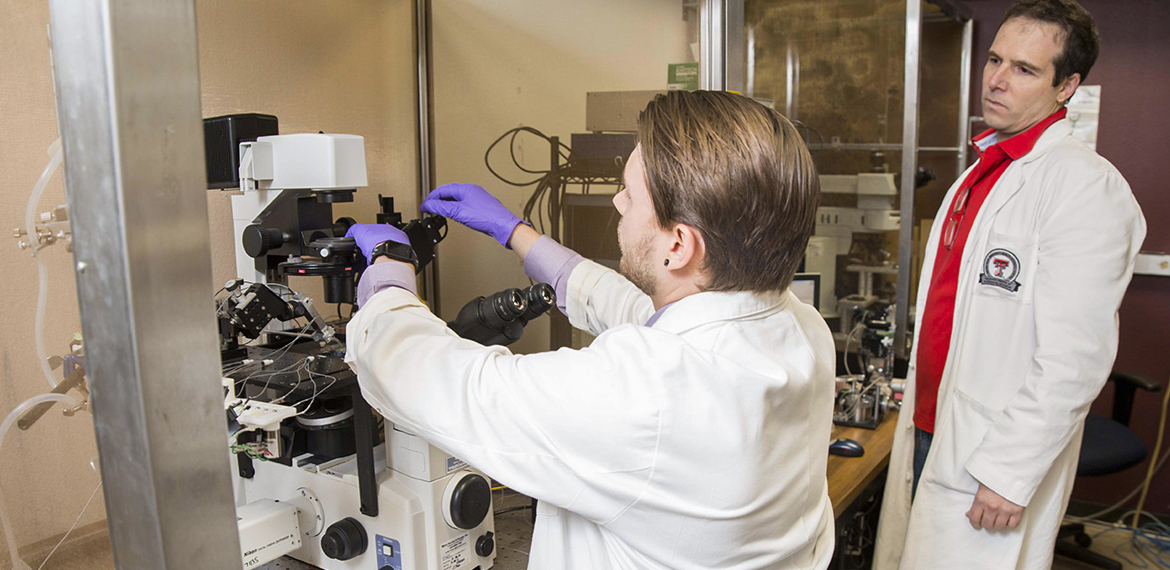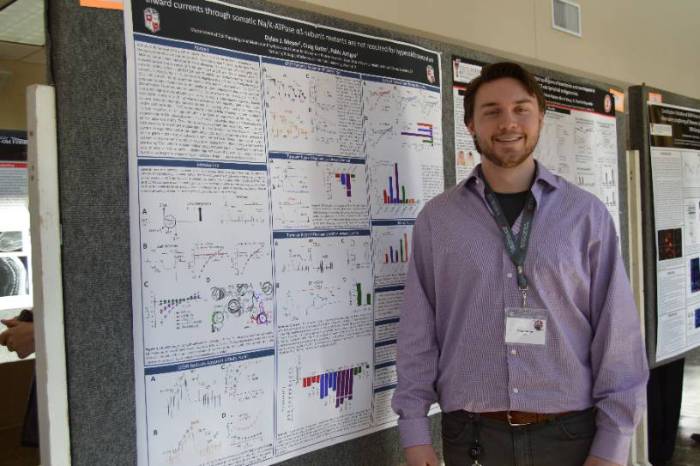Translational Neuroscience & Pharmacology Concentration

Concentration Overview
The objective of the Translational Neuroscience & Pharmacology graduate concentration is to prepare students for a broad range of potential careers, including research and teaching.
The Faculty of the graduate concentration seek to:
- Foster a creative and productive research environment
- Provide encouragement and positive challenge
- Equip students with the intellectual tools and critical thinking skills they will need to be effective teachers, investigators, etc.
Specialized research training is available in the following areas
- Brain health
- Pain
- Neuroplasticity
- Alcohol use disorder
- Neurodegenerative Diseases
- Stroke
- Cancer
Concentration Information
All Biomedical Sciences PhD students are admitted as Undeclared and may later select a mentor within the Translation Neuroscience and Pharmacology graduate concentration. In addition, the department houses the Center of Excellence For Translational Neuroscience and Therapeutics (CTNT), a team of both basic science and clinical faculty with research interests focused on all aspects of translational neuroscience.
Fall Semester
- GSBS 5471 Core I Molecules
- GSBS 5372 Core II Cells
- GSBS 5373 Core III Genes
- GSBS 5174 Core IV GSBS Seminar
- GSBS 5275 Core V Introduction to Biomedical Research
- GSBS 5000 Interprofessional Collaborative Practice
Total Credit Hours: 13
Spring Semester
- GSBS 5101 Responsible Conduct of Research
- GSBS 5098 Techniques in Biomedical Research
- GTNP 7101 Pharmacology Seminar
- GTNP 5303 Principles of Translational Neuroscience and Pharmacology
- GTNP 7102 Readings
Total Credit Hours: 12
Summer Semester
- GSBS 5098 Techniques in Biomedical Research
Total Credit Hours: 6
Fall Semester
- GTNP 7101 Pharmacology Seminar
- GTNP 7000 Research
- GTNP 7102 Readings
- GTNP 53XX or 54XX Elective Course
Total Credit Hours: 9
Spring Semester
- GTNP 7101 Pharmacology Seminar
- GTNP 7000 Research
- GTNP 53XX Elective Course
- GTNP 7102 Readings
- GSBS 5210 Intro to Biostatistics
Total Credit Hours: 9
Summer Semester
- GTNP 7000 Research
Total Credit Hours: 6
Fall Semester
- GTNP 7101 Pharmacology Seminar
- GTNP 7000 Research
- GTNP 7102 Readings
- GTNP 53XX or 54XX Elective Course (if needed)
Total Credit Hours: 9
Spring Semester
- GTNP 7101 Pharmacology Seminar
- GTNP 7000 Research
- GTNP 7102 Readings
Total Credit Hours: 9
Summer Semester
- GTNP 7000 Research
Total Credit Hours: 6
Fall Semester
- GTNP 7101 Pharmacology Seminar
- GTNP 7000 Research
- GTNP 7102 Readings
Total Credit Hours: 9
Spring Semester
- GTNP 7101 Pharmacology Seminar
- GTNP 7000 Research
- GTNP 7102 Readings
Total Credit Hours: 9
Summer Semester
- GTNP 7000 Research
Total Credit Hours: 6
Fall Semester
- GTNP 7101 Pharmacology Seminar
- GTNP 7102 Readings
- GTNP 8000 Pharmacology Doctoral Dissertation
Total Credit Hours: 9
Spring Semester
- GTNP 7101 Pharmacology Seminar
- GTNP 7102 Readings
- GTNP 8000 Pharmacology Doctoral Dissertation
Total Credit Hours: 9
Current tuition costs can be seen at the links below or by contacting Student Business Services from 8:30 a.m. to 4 p.m. CST at (806) 743-7867 for detailed fee information, including out-of-state tuition.
TTUHSC Student Business Services Main Page
TTUHSC Student Business Services Tuition Estimator
PhD students are eligible for financial support in the form of research assistantships at levels consistent with the policy of the Texas Tech University Health Sciences Center.

Center of Excellence For Translational Neuroscience and Therapeutics (CTNT)
The overall goal of The Center of Excellence for Translational Neuroscience and Therapeutics (CTNT) is to serve as an incubator for the generation and dissemination of knowledge related to the neurobiology of clinically relevant disorders. CTNT strives to generate, facilitate, and coordinate multidisciplinary efforts to build bridges between basic science and clinical departments required for the development of novel and improved diagnostic and therapeutic tools and strategies.
Admission Requirements
Requirements for admission are flexible and there are no minimum GPA or test score requirements. All applications are reviewed in a holistic manner, with no single factor determining a student's admission.
- Students may have a Bachelor's degree in any field but must include typical science courses (Chemistry, Biology, Zoology/Animal Science, etc.). A strong science background is encouraged.
- Average GPA of students offered admission is 3.41.
- Average GRE of students offered admission is 309.
Application Information
Deadlines
| Semester | Application Open | Application Deadline | Campus |
|---|---|---|---|
| Fall Only | September 1 |
Early Review December 1 |
Lubbock |
How to Apply
Applications must be completed at BioRaider. It is the responsibility of the applicant to make sure that their application is complete by the application deadline to be considered for admission. Incomplete applications will not be reviewed for admission. The program reviews programs on a rolling admissions basis.
A complete application is comprised of the following:
- A completely submitted application on BioRaider.com , which includes an Essay/Personal Statement
- At least 2 letters of reference written within the year of application
- Paid Application Fee
- Official College Transcripts for all institutions attended
Please note that the GRE or MCAT is optional.
GRE is optional. GRE scores can be submitted using the ETS Institution Code 6851.
- We require official transcripts from all U.S. institutions attended, including those institutions for which you received transfer credit toward your undergraduate degree.
- Electronic official transcripts from U.S. institutions are preferred and should be sent to: graduate.school@ttuhsc.edu.
- Do NOT send international transcripts and/or mark sheets. See application instructions below for more information.
- Hard copy official transcripts should be mailed to:
Texas Tech University Health Sciences Center
Graduate School of Biomedical Sciences
3601 4th St. MS 6206
Lubbock, TX 79430-6206
Click here to view in depth application instructions for BioRaider.com.
It's not what happens to you, but how you react to it that matters
Michael Blanton, Ph.D.
Program Director Translational Neuroscience & Pharmacology

